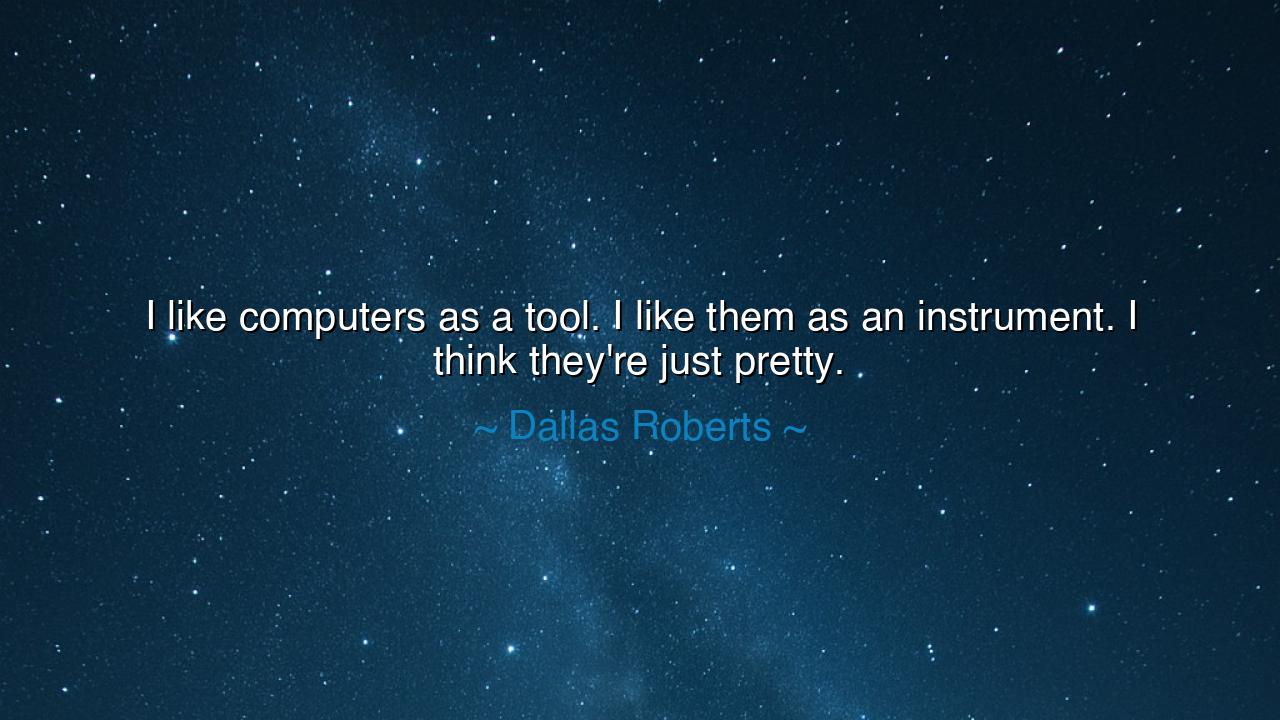
I like computers as a tool. I like them as an instrument. I think






"I like computers as a tool. I like them as an instrument. I think they're just pretty." Thus spoke Dallas Roberts, with words that shimmer softly between admiration and revelation. At first glance, his saying may seem simple — a passing comment on machines. Yet beneath its calm surface flows a deeper current of truth, a reflection on the relationship between humankind and creation, between the maker and the made. For in these few words lies the ancient spirit of wonder — the ability to see beauty not only in nature’s gifts but also in the works of human hands.
In the old days, the poets sang of fire, of the wheel, of the plow — all inventions once feared, then worshipped. The ancients saw tools as extensions of the soul, bridges between human will and divine possibility. The computer, to our age, is what the chisel was to the sculptor, what the lyre was to the bard. It is both tool and instrument, capable of shaping thoughts into forms, and silence into symphonies. In saying he finds it “pretty,” Roberts does not speak of vanity or ornament, but of the secret grace that lives within all things designed with care and purpose.
Consider the Renaissance, that golden dawn when art and science danced together. Leonardo da Vinci saw no boundary between brush and gear, between pigment and pulley. To him, invention was art and art was invention — the gears of a clock as sacred as the wings of an angel. So too does Roberts remind us that the computer, when rightly seen, is not cold metal, but the flowering of human imagination. It is the modern cathedral of thought, filled not with stone and stained glass, but with light, code, and infinite possibility.
Yet, there is a warning hidden within his gentle admiration. For when man forgets that the computer is a tool, he begins to serve it instead of shaping it. The ancients feared this — that the creation might one day enslave the creator, that Prometheus’s fire might consume those who stole it. To see the computer as “pretty” is to love it, yes — but also to remember that love must remain balanced with mastery. The machine is not our god, but our reflection; and as with all reflections, what we see depends on the light within us.
There is a story told of Ada Lovelace, the daughter of Lord Byron and the first visionary of computing. She called the machine a “poetical science,” a tool that might one day weave patterns of numbers as a loom weaves flowers. She saw not just logic, but beauty, in its design — the merging of intellect and art. Long before Dallas Roberts spoke his words, she too perceived the elegance of the unseen — the poetry behind precision. And thus, she became the mother of a dream that would shape the future of all creation.
To those who live in this modern age of screens and circuits, this quote is both reminder and call: Do not let the glow of technology blind you to its grace. Use your machines as the artist uses his brush — with reverence, purpose, and imagination. See in the smooth lines of your keyboard, in the hum of your processor, the quiet song of progress and potential. And when you look upon your work, whether in art or code, see not a gadget or a graph, but the living testament of human curiosity — the echo of that first spark that lit the stars.
The lesson is clear, my friends: beauty is not limited to nature — it is born wherever creation meets intention. To love the computer is not to love metal, but to love the miracle of the mind that built it. It is to see in every circuit a vein of human spirit, pulsing with invention. So take up your tools — whatever they may be — and let them sing. Treat them not as slaves, but as companions on your path of creation.
And when next you sit before your screen, remember Dallas Roberts’s gentle truth. Look upon your computer not as a cold contraption, but as a mirror of your own creative fire. Use it wisely, play it bravely, and see the beauty that lies in its glow — for in that glow lives the same light that once guided the hands of the ancients, the artists, and the dreamers who made the world anew.






AAdministratorAdministrator
Welcome, honored guests. Please leave a comment, we will respond soon